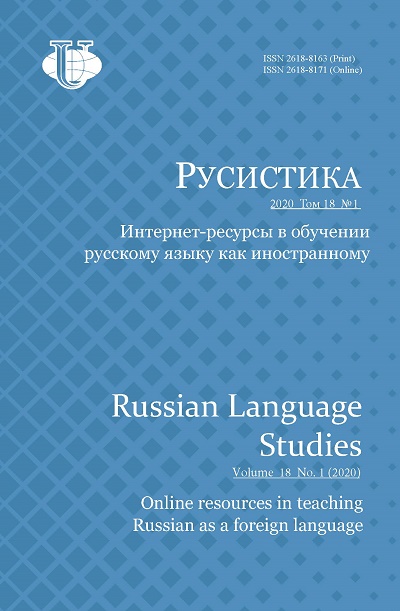Online resources in teaching Russian as a foreign language: expectations vs reality
- Authors: Vyazovskaya V.V.1, Danilevskaya T.A.1, Trubchaninova M.E.1
-
Affiliations:
- Voronezh State University
- Issue: Vol 18, No 1 (2020): ONLINE RESOURCES IN TEACHING RUSSIAN AS A FOREIGN LANGUAGE
- Pages: 69-84
- Section: Mediadidactics and electronic means of instruction
- URL: https://journals.rudn.ru/russian-language-studies/article/view/23213
- DOI: https://doi.org/10.22363/2618-8163-2020-18-1-69-84
- ID: 23213
Cite item
Full Text
Abstract
The paper discusses using online resources in modern teaching Russian as a foreign language (henceforth - RFL). A lot of resources for teaching and learning Russian are uploaded online daily. However, the format of their integration into educational process has not been analyzed yet. The acuteness of the present study stems from the necessity to define effective educational online resources for teaching RFL. The study draws upon the data of free-access online resources developed for A0-B1 level students in leading Russian universities. The aim of the study is to analyse online RFL resources, including educational software, applications and sites, their structure and their chances to be integrated into teaching process. The research has resulted in estimating educational and functional value of online teaching resources for students who study Russian in order to enter Russian universities. The paper presents conclusions concerning practical application of online resources in RFL teaching practice in blended education of foreign students in the higher educational establishments. The theoretical significance of the research lies in the fact that the analysis of fundamental scientific articles and electronic materials allows us to expand and deepen our knowledge about the place of e-teaching aids in the sphere of teaching foreign languages and RFL, as well as to justify the need to include electronic teaching materials in order to intensify the learning process. The results of the research can be implemented in blended forms of learning, distance learning, as well as in organizing students' independent learning in the university environment.
About the authors
Victoria V. Vyazovskaya
Voronezh State University
Author for correspondence.
Email: vyazovskaya@interedu.vsu.ru
Ph.D., Associate Professor, Department of Russian as a Foreign Language for Pre-University Students, Institute of International Education
1 Universitetskaya Sq., Voronezh, 394018, Russian FederationTatiana A. Danilevskaya
Voronezh State University
Email: danilevskaya@interedu.vsu.ru
Ph.D., Associate Professor, Department of Russian as a Foreign Language for Pre-University Students, Institute of International Education
1 Universitetskaya Sq., Voronezh, 394018, Russian FederationMargarita E. Trubchaninova
Voronezh State University
Email: trubchaninova@interedu.vsu.ru
Ph.D., Associate Professor, Department of Russian as a Foreign Language for Pre-University Students, Institute of International Education
1 Universitetskaya Sq., Voronezh, 394018, Russian FederationReferences
- Arkhangel'skaya, A.L., & Zhigunova O.M. (2012). To the Problem of Formation of Electronic Educational Environment on the University Portal for Foreign Students of Pre University Stage of Training. Bulletin of Peoples’ Friendship University of Russia. Series: Educational Issues: Languages and Specialty, (3), 110–115. (In Russ.)
- Azimov, E.G. (2012). Informatsionno-kommunikatsionnye tekhnologii v prepodavanii russkogo yazyka kak inostrannogo [Information and communication technologies in teaching Russian as a foreign language]: a methodological guide for teachers of Russian as a foreign language. Moscow: Russkii yazyk. Kursy Publ. (In Russ.)
- Bogomolov, A.N. (2008) Nauchno-metodicheskaya razrabotka virtual'noi yazykovoi sredy distantsionnogo obucheniya inostrannomu (russkomu) yazyku [Scientific and methodological development of a virtual language environment for distance learning of a foreign language (Russian)]. [Author’s abstr. doc. ped. diss.]. Moscow. (In Russ.)
- Bovtenko, M.A. (2005). Komp'yuternaya lingvodidaktika [Computer linguodidactics]: manual. Moscow: Flinta – Nauka Publ. (In Russ.)
- Dugartsyrenova, V.A., & Sardegna, V.G. (2017). Developing oral proficiency with VoiceThread: Learners' strategic uses and views. ReCALL, 29(1), 59-79. Retrieved January 01, 2019 from: https://https://www.scopus.com/inward/record.uri?eid=2-s2.0-84987642401&doi= 10.1017%2fS0958344016000161&partnerID=40 &md
- Dziuban, Ch., Graham, Ch.R., Moskal, P.D., Norberg, A., & Sicilia N. (2018). Blended learning: the new normal and emerging technologies. International Journal of Educational Technology in Higher Education. Retrieved January 01, 2019 from: https://doi.org/ 10.1186/s41239-017-0087-5
- Elaish, M.M., Shuib, L., Abdul Ghani, N., Yadegaridehkordi, E., & Alaa, M. (2017). Mobile Learning for English Language Acquisition: Taxonomy, Challenges, and Recommendations. IEEE Access, 5, 19033-1904. Retrieved January 01, 2019 from: https:// www.scopus.com/inward/record.uri?eid=2-s2.0-85030220700&doi=10.1109%2fACCESS. 2017.2749541&partnerID=40&md5=a33cbe79759831796033572948cd7be3. doi: 10.1109/ ACCESS.2017.2749541.
- Gartsov, A.D. (2008). Russian language in the infocommunication space. Bulletin of Peoples’ Friendship University of Russia. Series: Educational Issues: Languages and Specialty, (4), 5–9. (In Russ.)
- Hromov, S.S., Gulyaeva, N.A., Apal’kov, V.G., & Nikonova, N.K. (2015). Information and communication technologies in teaching of Russian as a foreign language at the initial stage (A1, A2 levels). Open Education, 2, 75–81. (In Russ.)
- Institute of International Education of the Voronezh State University. Retrieved January 26, 2019 from: http://interedu.vsu.ru/index.php/ru
- Ismailova, K.E., Arzumanova, R.A., Katsyuba, L.B., & Pshenichnikova, A.Y. (2018). Metho- dological foundations of teaching vocabulary to foreign students-nonphilologists by means of computer technologies (initial stage of training). Espacios, 39(29). Retrieved January 01, 2019 from: https://www.scopus.com/inward/record.uri?eid=2-s2.0-850502 51101&partnerID=40&md5=34b05a0ca8374433ceac379c808b7fa
- Kapitonova, T.I., & Moskovkin, L.V. (2006). Metodika obucheniya russkomu yazyku kak ino- strannomu na etape predvuzovskoi podgotovki [Methods of teaching Russian as a foreign language at the pre-university stage]. Saint Petersburg: Zlatoust Publ. (In Russ.)
- Kozhevnikova, E.V., Vyazovskaya, V.V., & Trubchaninova, M.E. (2019). Russian as a foreign language textbook: at the crossroads of ways, opinions and interests. Russian Language Studies, 17(1), 46–62. (In Russ.)
- Listiana, N., & Jaharadak, A.A. (2019). Blended Learning as Instructional Media: Literature Review Journal of Physics: Conference Series, 1167(1). Retrieved January 01, 2019 from: https://www.scopus.com/inward/record.uri?e
- Naseikina, L.F. (2010). Interactive electronic textbooks in modern open education. Bulletin of Orenburg State University, 5, 30–35. (In Russ.)
- Rusetskaya, M.N. (2015). Educational cyberspace: new opportunities for learning the Russian language. Russian language abroad, 3, 6–10. (In Russ.)
- Shaklein, V.M. (2008). Russkaia lingvodidaktika: istoriya i sovremennost’ [Russian linguodidactics: history and modern times]: textbook. Moscow: RUDN University. (In Russ.)
- Tryapelnikov, A.V. (2012). Electronic format in Russian as foreign language teaching: new concepts and terms in computer linguodidactics. Russian language abroad, 1, 46–51. (In Russ.)
- What Is Blended Learning? Retrieved January 01, 2019 from: https://www.mindflash.com/ elearning/what-is-blended-learning
Supplementary files














